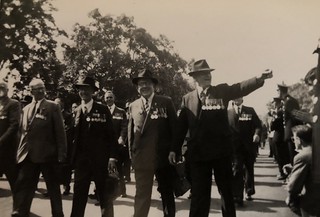Dunkirk. Whenever I see something on TV or read something about Dunkirk, it makes me think about my grandad. He was there. Not only was he there, he was awarded the Distinguished Conduct Medal (DCM) for his bravery. Here is the citation from the British Army record:
WO2 (RQMS) Acting WO1 Supt Clerk Walter William Page DCM, Royal Signals
This WO is Superintending Clerk to SO in C. He was sent from Premesques late on 26th May in charge of 10 other ranks to report to an officer at Dunkirk. For various means the rendezvous miscarried and RSM Page tried to reach the Signal office in Dunkirk. Being prevented by burning buildings in this object, he went to the docks in search of an officer. There he found an officer of the Merchantile Marine in command of a supply ship to be unloaded. He collected about 150 men of various arms and departments in the dock area and kept them at work unloading through the 27th under heavy bombing attacks, until an ammunition ship alongside was bombed and set on fire about 2200hrs. He showed resource, initiative and determination to a high degree.
Gazetted 11.7.40
That’s my Mum’s Dad, Walter William “Pip” Page. He’s why I have a middle name of “William”. I can remember sitting next to him on chair in his house and reading his copies of “Solider” magazine without ever really thinking what it must have been like for him, as for my father, to have been one.
Not only was he a solider, he was a brave one. There were around eight million British and Commonwealth soldiers who served in World War II and between them they won 1900 DCMs, so he was part of a pretty select group. It was a medal awarded to non-commissioned officers (NCOs) and other ranks for “distinguished, gallant and good conduct in the field”.
The Distinguished Conduct Medal was instituted by Royal Warrant on 4 December 1854, during the Crimean War, as an award to Warrant Officers, Non-Commissioned Officers and men. For all ranks below commissioned officers, it was the second highest award for gallantry in action after the Victoria Cross, and the other ranks' equivalent of the Distinguished Service Order, which was awarded to commissioned officers for bravery. Prior to the institution of this decoration, there had been no medal awarded by the British government in recognition of individual acts of gallantry in the Army
When I was a kid, staying at my grandparents house for the summer in the 1960s, VE Day was only 20 years back. That’s as far back from now as the death of Princess Diana and I can remember that. It never occurred to me when I was little that my parents and grandparents could actually remember what it was like during an actual war. We used to go along to watch my grandfather (second right below) take part in the DCM holders march. I can’t imagine that as a small boy I could have had any comprehension of what it really meant.
At that age, I devoured Victor (my favourite comic at the time) and ploughed through the Commando. I don’t remember ever thinking that for my grandad these were not distant events but events that we still fresh in the mind and with undoubtedly horrible memories.
Now that I’m old and realise all of this, I was in two minds about whether to go and see the movie or not, because I didn’t want to disrespectful to my grandfather’s memory by enjoying the film (if you see what I mean). After all, Dunkirk must have been terrible for the people like him who were actually there. On the other hand, the film tells the story of him and people like him and reminds us of their sacrifices.
Anyway, in the end we went and I’m glad we did. Dunkirk is a good movie. It's not a great movie, but it is a good movie and I didn't resent paying to go and see it on the big screen which is more than I can say for quite a few others.

Comments
Post a Comment